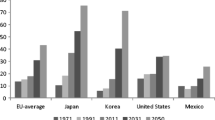Abstract
Why do different countries exhibit different inflation rates? Most political economy accounts emphasise the role of ideas and institutions: as economic research shows that low inflation is achievable at no economic cost, governments delegate monetary policy to independent central banks. Countries with independent central banks and unions that anticipate the consequences of their actions by coordinating wage bargaining in turn achieve lower inflation. This conventional wisdom downplays the importance of interests, ignoring the significant influence that a growing electoral group — the elderly — has on inflation. Because the elderly are politically powerful and inflation averse, countries with more elderly citizens force political parties to adopt more economically orthodox policies when in power, resulting in lower inflation rates in those countries. Ageing populations may therefore lock in a low inflation regime, even when this is not economically desirable.
Similar content being viewed by others
Author information
Authors and Affiliations
Corresponding author
Additional information
Tim Vlandas, University of Reading, UK.
Rights and permissions
About this article
Cite this article
Vlandas, T. The Political Effects of Ageing on Inflation. Intereconomics 51, 266–271 (2016). https://doi.org/10.1007/s10272-016-0616-9
Published:
Issue Date:
DOI: https://doi.org/10.1007/s10272-016-0616-9




